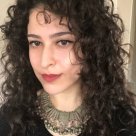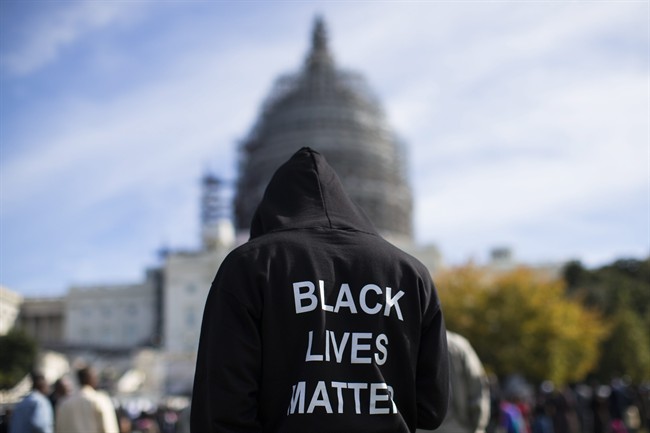The anger and heartbreak that George Floyd, an unarmed Black man, was killed by police in Minneapolis is being felt right here in Nova Scotia.

“When you look at it from the perspective of just what’s in the news, I mean, we’re still grieving for Ahmaud Arbery,” said Verena Rizg, a nurse practitioner and writer who has been involved in advocacy work.
“He was killed in broad daylight very recently simply for jogging, and the people who killed him walked free until the masses came together and spoke up.
“That alone is traumatic.”
READ MORE: Protesters angered by George Floyd’s death set fire to Minneapolis police station
On the same day that Floyd was murdered, a Black bird watcher named Christian Cooper in New York City went viral after a white woman named Amy Cooper (no relation) called the police on him, addressing him as a threatening African-American.
And after a Black woman in Toronto died after falling from a balcony following local police responding to a call in her home, many are demanding accountability.
“These traumatic events are heavy. Repeatedly seeing someone who looks like you unarmed and killed mercilessly is a different kind of trauma,” said Rizg.
“This is even harder when paired with racial microaggressions that occur everyday in the lives of POC. So, in addition to anti-racism, there needs to be resources to help people through racial trauma.”
Rizg went on to say that the incident of Amy Cooper, following the murder of George Floyd, was almost like a catalyst for people to confront the realities of racism.
“It’s a representation of someone standing in their privilege and using it as a flex of power, very knowingly. It’ someone saying, ‘I’m going to do this because I know what it will do to you because I know the power I have’.”
READ MORE: George Floyd death — Trudeau condemns anti-Black racism in Canada as protests erupt in U.S.
Rizg says racism is a problem everyone needs to face together and isn’t something that’s unique to the United States, where protests and riots have been taking place in response to Floyd’s death.
“It is exhausting as a person of color to always have to explain to people that our reality is real, that my lived experience is valid,” she says.
Rizg says she can share countless moments where she had to face racist situations.
“Every person of color in health care remembers the first time a patient called him or her a racial slur. Everyone,” said Rizg. “The first time it happened to me was actually in a placement in school.
“I can’t tell you how many times people have made comments about my hair or skin and just not realizing that when you tell me my hair looks so much better straight, you’re playing into a Eurocentric form of beauty,” Rizg said.
She said people must think about what it means to be an ally to Black people during this traumatic time, and invest in anti-racism work in their own homes, schools and workplaces.
“These incidences, these killings, these murders are not isolated events and I would like to say that the ability to be surprised is…a reflection of privilege.”
Rizg also went on to say that she doesn’t believe in labelling people.
“What I mean by that is that I don’t like saying, so-and-so is racist,” she said. “I believe in addressing racist actions, behaviors, tendencies, languages. … Let’s dismantle oppressive language and thought.”
She’s also encouraging people who want to be allies to put in the work and do some research instead of asking their Black friends or peers so many questions.
“We live in the age of information. It has never been more easy to be informed and to get informed, ” said Rizg. “I would just encourage people to be mindful of placing extra, immense emotional burden on people who are hurting right now because of collective trauma. This is collective grief — and why I’m so tired right now.”
Nova Scotian public speaker and filmmaker, Tyler Simmonds, says he has been extremely exhausted and hurt by the death of Geroge Floyd, and is taking the time to stay away from social media and take care of his mental health.
“It has been extremely hard for me. It can just make you angry, which is coming from a real place,” said Tyler. “I think we should allow ourselves to get angry, but the anger can become too much and it can turn to self-destruction. It could turn to this rage.”
As a Black man, he said he knows all too well how it feels to be feared or undermined due to the colour of his skin.
“For a lot of black people, seeing a police car driving behind you is anxiety-inducing, when they are supposed to protect us, and I feel that’s really problematic,” said Tyler. “It’s this feeling of being watched or that I need to behave.”
READ MORE: Ongoing violence against Black people is causing trauma: ‘It’s draining’
He said the racism in Canada is “subtle.”
“It’s not just somebody coming out and calling you a racial slur. It’s sometimes people holding you back from opportunities or telling you that you can’t do something because of the colour of your skin.”
Tyler said right now Black people really want to figure out how they can make things better.
“We can’t make things better unless we first take care of ourselves. I would say to the Black community, make sure that you’re taking care of yourself now, making sure that you’re physically, mentally fit because we need you.”
As the Black community comes together to heal, Rizg is encouraging everyone to ask, “How does privilege benefit you? How do you benefit from privilege? How are you privileged? And how inclusive are your spaces?”
READ MORE: Activists demand accountability after Toronto Black woman’s death in High Park
“Take a look at your group of friends. Take a look at your workplace. Take a look at your kids’ schools. How inclusive are your spaces?”
But the “trickiest question” people who want to be allies must ask themselves, says Rizg, is how oppressive the language they use is.
“What are some of the implicit biases that people have? Because we all have implicit bias based on where and how we grew up. We all have unlearning to do, and that is not to sit and blame anyone or point fingers,” Rizg said.
“There will be no opportunity for healing if we don’t embrace unlearning and the reality is some of us have a lot more unlearning to do than others, for sure.
“Everything starts at home. Everything starts with self.”
-With files from Arti Patel






Comments